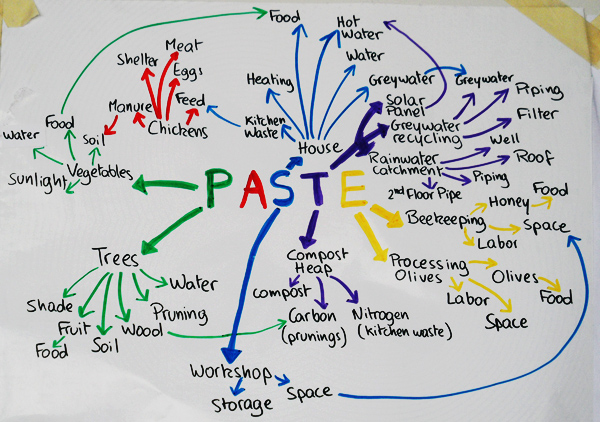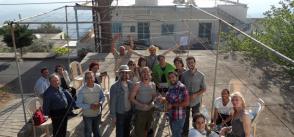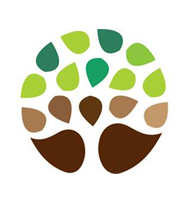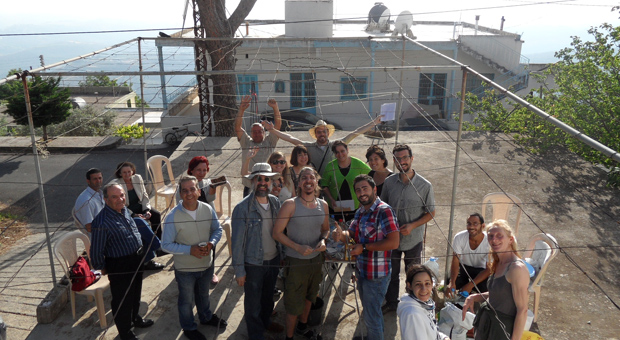
Promoting permaculture ethics: interview with Rita Khawand
SOILS Permaculture Association Lebanon is a community-based network dedicated to promoting permaculture ethics and principles.
Intrigued by their approach to sustainable development, we took the chance to pose some questions to Rita Khawand, co-founder of the association.
- In your website, one can read “SOILS is dedicated to applying Permaculture ethics and principles in design systems that work with nature - not against it to provide food, energy and shelter in both rural and urban communities”: can you tell us something more on your activities?
As the only permaculture organization in Lebanon, it is essential for us to make permaculture an integral part of the social and civic discourse in the country. We try to create awareness by assembling existing initiatives in different fields (natural building, natural growing, waste reduction, renewable resources, environment protection, sustainable development, etc.) under the same umbrella. We tackle two fronts simultaneously: achieving sustainable rural development, and introducing city-dwellers to permaculture tools for reducing consumption and waste.
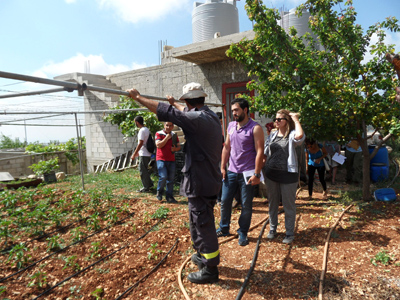 We established our headquarters and demonstration site in the village of Saidoun (Jezzine caza) - South Lebanon, where two of our founding members are from. There, SOILS Permaculture Association Lebanon benefits from the support of locals, as well as the agricultural cooperative, the municipality and the Union of Municipalities of Jezzine.
We established our headquarters and demonstration site in the village of Saidoun (Jezzine caza) - South Lebanon, where two of our founding members are from. There, SOILS Permaculture Association Lebanon benefits from the support of locals, as well as the agricultural cooperative, the municipality and the Union of Municipalities of Jezzine.
The high point of our first year was in May 2014 when we successfully organized the Permaculture Design Certificate (PDC) course in Lebanon (in the village of Saidoun) for the first time ever. This made the PDC more affordable for locals and also contributed to bringing additional income to as many of the villagers as possible (whether from cooking meals, renting rooms, selling produce, or offering other services).
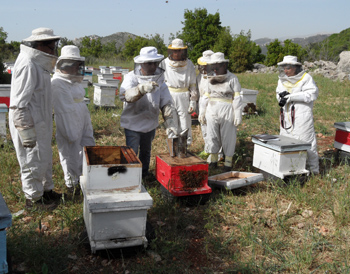 Recently, we earned the first prize in the 2014 Lebanese Sustainable Development Competition for "Afir" ("beehive" in Arabic), an eco-museum project in Saidoun. The project involves restoring a historical old stone house in Saidoun and eco-renovating it to convert it into a learning center and bed-and-breakfast welcoming schools and visitors. The center will include a permaculture garden showcasing local bee-friendly plants to help teach visitors about the importance of bees for the environment and the means of preserving bee habitats.
Recently, we earned the first prize in the 2014 Lebanese Sustainable Development Competition for "Afir" ("beehive" in Arabic), an eco-museum project in Saidoun. The project involves restoring a historical old stone house in Saidoun and eco-renovating it to convert it into a learning center and bed-and-breakfast welcoming schools and visitors. The center will include a permaculture garden showcasing local bee-friendly plants to help teach visitors about the importance of bees for the environment and the means of preserving bee habitats.
In parallel, we will propose organic gardening and recycled crafts workshops.
On the urban level, we kicked off the year with a full day of presentations and workshops related to permaculture, in partnership with Gardens Without Border (Canada). Working our way up to the PDC, we also held several info-sessions and small workshops to introduce city-dwellers to permaculture and answer their questions. This gave us a chance to grow our network and outline synergies between different people. We keep in touch with the growing permaculture community thanks to our monthly e-newsletter, L.E.T.S. Lebanon, which includes news, focus pieces, tips and resources. We also set up a website and social media channels to have a unified communication strategy.
- Which are the advantages of permaculture in achieving sustainable development?
When we founded SOILS Permaculture Association Lebanon in January 2014, we had our work all cut out for us. Rampant urbanization, along with the lack of strategic development plans and proper environmental regulation threatened not only existing ecosystems but also people's way of life. Continuous population movements to urban centers in the search of financial and political stability caused the loss of considerable ethno-botanical knowledge and agricultural knowhow in rural areas.
On the other hand difficult socio-economic and political circumstances meant that more young people were growing disenchanted with city life but lacked the tools and means of returning to the countryside. In this context, permaculture seemed the ideal alternative.
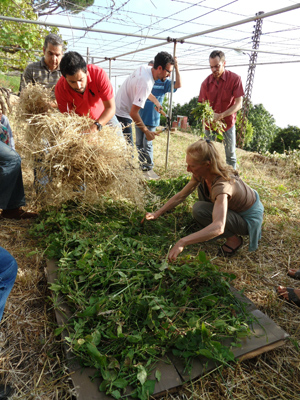 Permaculture made it easy to relate to people individually; since it encompasses different fields, it allowed us to deal with farmers, architects, engineers, carpenters, environmental activists, nutritionists, artists and students.
Permaculture made it easy to relate to people individually; since it encompasses different fields, it allowed us to deal with farmers, architects, engineers, carpenters, environmental activists, nutritionists, artists and students.
This resonated with the public and saved us from reductionist labels such as "environmentalists". We introduced different individuals to a wide range of possibilities and tools to make important lifestyle changes such as producing more and buying responsibly.
For instance, making compost, even in an apartment, is an easy and encouraging step to growing more plants and producing your own fertilizer from kitchen waste. Seed balls are also a fun way to resist against the concrete landscape. From then on, the philosophy and ethics of permaculture (People Care, Earth Care and Fair Share), advocated through our communication strategy, enabled us to build strong personal ties with our community and gave us an edge in bringing people together and spreading the word about their projects.
In practice, permaculture seeks to "maximize output and minimize input", i.e. minimal effort for maximum results. In Saidoun, we saw agricultural practices that are energy-consuming and environmentally detrimental even while income from these practices remained low. Many villagers grow tobacco only using large quantities of herbicides and pesticides to guarantee a good harvest, and such methods have grown increasingly widespread.
Permaculture could improve and diversify production while reducing costs and preserving the natural balance.
During the PDC, several villagers participated in the sessions and practical workshops. This gave them a chance to get acquainted with concepts like integrated pest management (combining natural liquid pesticides and natural fertilizers with practices like planting local species and promoting crop diversity) and composting, - which was a clear favorite.
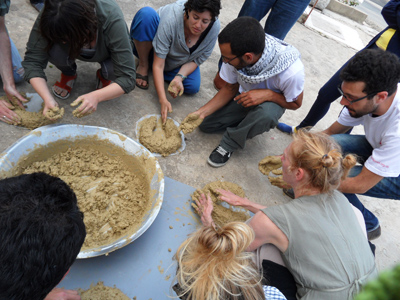 Saidoun is a tiny village of only 150 permanent residents that offered no economic prospects.
Saidoun is a tiny village of only 150 permanent residents that offered no economic prospects.
When we first started our activities there, locals were skeptic - after all, what guarantee could we offer them? However, after a little over a year, the village has evolved, slowly but surely.
We started sewing workshops for women to develop a line of shopping bags made from fabric scraps that we will start marketing soon. Other women have shown interest in producing crafts from recycled materials.
Our energy grew contagious; Saidoun was recently acknowledged for its achievements at the 2014 Lebanese Sustainable Development Competition. The municipality refurbished the abandoned school building (with some energy-saving strategies such as solar water heaters for heating) and converted it into a learning and activities center, as well as a hostel. The municipality also helped residents secure loans for solar water heaters. Our upcoming project, Afir, will preserve an old stone building (the only one standing after the devastating 1956 earthquake) and involve more locals in organizing hikes and nature walks, selling crafts and produce, creating educational material, etc.
- How well-developed is permaculture in Lebanon? And which are, in your opinion, the obstacles for fully developing this approach?
When we started out, only a handful of people were even familiar with the word permaculture and even fewer isolated small-scale operations were actually putting its principles into practice.
Because most of us had no land of our own or notion of agriculture and sustainable practices, we had to become the change we want to see in the world. With limited resources, we relied on local experts to build our capacities and, in turn, we introduced them to a wider range of possibilities through permaculture.
Gradually, we found ourselves growing more confident in our capabilities and in sharing these skills. Rather than preach theory and rely on resources from other countries, we began to demonstrate permaculture and build a body of knowledge of our own, tailored to local needs and conditions, namely giving introductory sessions and workshops ourselves (beekeeping, seed balls, composting) and compiling information, recipes and tested DIY projects.
On the ground, established mentalities and preconceptions about agriculture constitute our main challenge. Our lack of practical experience in agriculture makes it difficult to convince older conventional farmers of the validity of permaculture tools, hence the need to develop our permaculture demonstration site.
Meanwhile, new " permaculture converts" are overflowing with goodwill and ideas, but the difficulty lies in securing adequate funding and finding available and dedicated people to follow through on projects.
